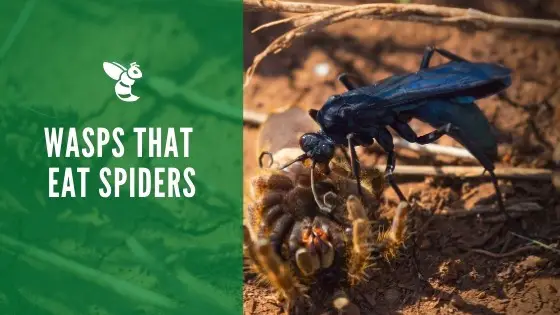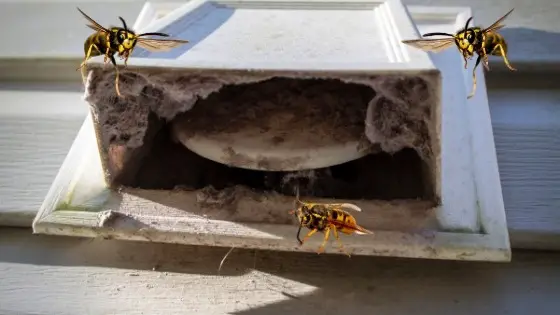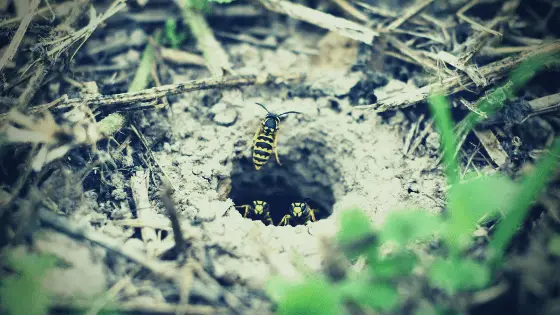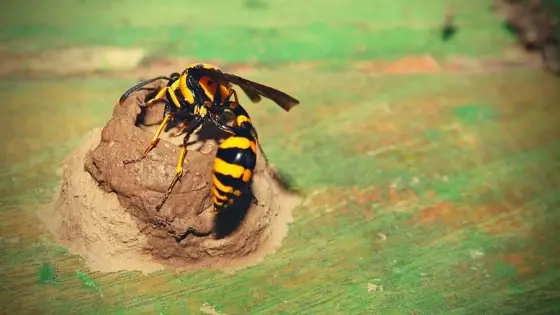Wasps That Eat Spiders

Wasps are often compared to bees, but they are a very different insect that resembles a bee and another segmented insect like an ant. With the ability to quickly fly and sting anyone threatening them, wasps have their place in nature.
There are currently more than 9,000 discovered species of wasps in the world. With each species, many differences contribute to how wasps survive and thrive. For example, their diets can vary. They also differ in how they live, build their nest, and react to nearby humans.
If you have a large spider population in your yard, you may be wondering if having wasps around would be beneficial. After all, don’t all wasps eat insects? Depending on where you live in the country and your property, there may be different species of wasps nearby.
If you can effectively identify the types of wasps on your property, you can better understand how they can help control your spider population.
What Kind of Wasp Eats Spiders?
There are several different types of wasps that consume spiders. Many of the queens from these wasp species will utilize spiders as their vessel for laying eggs. You’ll see several spider casualties in your yard if you have mud daubers, yellow jackets, tarantula hawks, and paper wasps.
Don’t be surprised if you see a wasp buzzing around your meal. Many wasps that consume spiders and other insects will also be tempted by the smell of human food as well, like meat.
Do Wasp Stings Kill Spiders?
A wasp can sting a spider during the pursuit of their next meal. If the spider does nothing, the venom from the wasp will kill the spider. There have been instances of a spider chewing off one of their limbs to save themselves.
Certain types of wasps will sting a spider to paralyze it. They can then consume the spider or take it back to their nest to feed their larvae. The process of a wasp killing a spider can vary from situation to situation.
If you have some time to sit in your yard, you very well may be able to spot an interesting show. Aim for an area where you know there’s an active spider web. You might be shocked to see the process unfold.
While a wasp can kill a spider for food, a spider can sometimes protect itself and flip the script. Spiders weave intricate webs that wasps often find themselves trapped in. Spiders use their web as a method to collect their next meal. If a wasp attempts to attack the spider but becomes entangled in its web, the spider may be able to kill the wasp and eat them.
Do Spiders Attract Wasps?
Wasps spend a good part of their day looking for their meals. They assess certain areas to figure out where the best insects are located. If they discover that a spot in nature or your yard has many insects or spiders in it, this will be an area that they will often come back to, and you can expect both social and solitary wasps to make an appearance.
Do Wasps Lay Eggs in Spiders?
Certain types of wasps like the mud dauber will kill a spider to use it as a vessel for their eggs. They will sting the spider, paralyze it, bring it back to their nesting area and then proceed to kill it and lay their eggs inside of it.
This process is designed to provide the wasp larvae with an immediate and fresh meal when they hatch. They won’t have to travel anywhere to get their food, and nobody will have to bring them food to help them grow and thrive as an adult wasp.
Why Do Wasps Attack Spiders?
Wasps are looking for their next meal. They are more than likely looking for food to take back to their larvae or the other colony members/queen. A spider tends to be a pretty slow insect that can be attacked and consumed in the right situation.
Some species of wasps are herbivores, but the majority of them are omnivores. Some may mix a diet of these two options to get a well-balanced meal. Nectar from flowers is also a favorite treat that they consume for their own benefits.
Insects and larvae from spiders and other insects are usually what wasps tend to feed to their larvae. Besides spiders, you’ll see a large prevalence of wasps if you have a healthy population of ants, flies, crickets, grasshoppers, and cicadas. Just be careful that they aren’t creating a nest nearby that could pose a dangerous risk to you as a homeowner.



